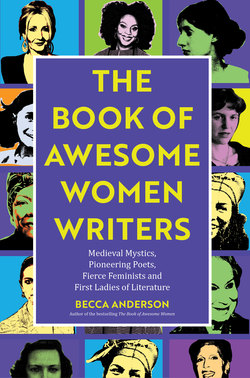Читать книгу Book of Awesome Women Writers - Becca Anderson - Страница 7
На сайте Литреса книга снята с продажи.
ОглавлениеEditor’s Note
by Ntozake Shange, poet, playwright, and author
Women have shaped and inspired me my whole life, especially women writers, in whom I have found inspiration, hope, and camaraderie. One can never underestimate the power of women—they have motivated, stimulated, and encouraged since the first book was written. In fact, a woman may have written the first book! The Book of Awesome Women Writers explores in a compelling manner the fascinating history and work of the world’s most beloved and influential women writers, without whom I never would have been a success.
As a curious and impressionable young girl, I was blessed with a mother who educated me about Black women writers. My mother shared her race records with me (similar to race books), which documented the traditions, achievements, and work of Black writers. I was especially inspired by Phillis Wheatley and Lucy Terry Prince, pioneering African American women and some of the first women writers in America—if not the first.
My mother also took me to see Lorraine Hansberry’s A Raisin in the Sun—a pivotal and moving moment in my life which encouraged and nurtured my creativity. The work and courage of this successful woman of color, who shared her message with audiences all over the country (and later, all over the world), became the foundation upon which my creativity was developed.
I was moved in a similar manner while studying at Barnard, where I was introduced to Anna Akhamatova’s Russian poetry and Virginia Woolf’s To the Lighthouse. I was so taken with To the Lighthouse that it was the subject of my freshman composition; I argued that Woolf was writing about the choices a woman has to make. My professor wrote on my paper that it was about “the choices a person has to make,” but, to me, it was specifically about the ensuing weight and consequences of those decisions. In The Book of Awesome Women Writers, Becca Anderson explores the complex life and work of both these mavens, along with the history and achievements of many other women writers.
In my senior year of college, Caroline Rodgers published a little paperback poetry book that changed my life and influenced my own writing—her stanzas were sculpted in such a way that they flowed like rivers—and that continues to be important to me today. I owe a great deal in terms of lyricism and syntax to Zora Neale Hurston, who along with Sonja Sanchez and June Jordan influenced my personal writing style.
I respected June Jordan, whom I met during college, because upon reading her work I was filled with delight—she tackled public issues through a female voice. That was and still is extremely important to me.
My first experience with writing came about because there were no Black women writing about themselves, the world, and politics—so we had to write it for ourselves. In 1967, my friend Tawani Davis and I approached Barnard for a grant because we noticed there was no published literature by women of color. With the five hundred dollar grant, we designed a magazine called Fat Mama that published drawings, pieces of music, and poetry by women of color. We had our first taste of self-publishing and loved it—we had the opening party at the African American Museum in Harlem.
While in graduate school, I was enchanted by Diana Lakoskey, Anne Petrie, Margaret Randall, and the narratives of Maya Angelou. Around this time, I discovered two works that changed my life, Susan Griffin’s Women and Nature and Mary Daly’s Gyn/Ecology, both of which I still rely on when I teach feminist literature and aesthetics.
Soon after For Colored Girls Who Have Considered Suicide/When the Rainbow Is Enuf was published, I encountered incredible hostility. When it opened, I was subject to much animosity from the Black male community, but I did experience the joy of reaching women (eventually reaching women all over the world). I now know that what I went through was worth it, for women globally have had the opportunity to perform For Colored Girls and it’s been true for them—and that is an amazing phenomenon. I’m very grateful and humbled by it.
Today I am lucky enough to be constantly working with Black women writers—we read and critique each other’s work and support each other. I am in a community of writers with the very women who have influenced me the most—Toni Morrison, Alice Walker, and Maya Angelou. I am truly blessed on this journey.
This book is a testament to the relationship and contributions of women writers, lest we forget their impact and inspiration. Becca paints portraits of women writers with her energetic and enigmatic words in an accessible and engaging manner. Please join me on this amazing journey through women’s history—I know you will be as inspired by it as I have been.
